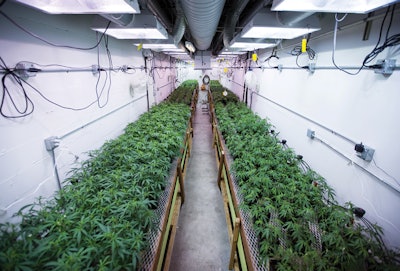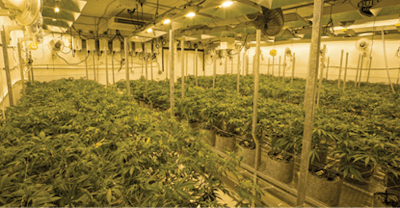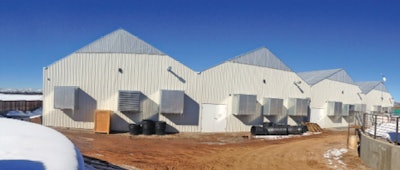
“A lot of times, you have to check your ego at the door when it comes to business, and look at it very objectively, and see what the best solution is.” – Spencer Schrote, Co-Owner, Royal Tree Gardens
What enables a cannabis cultivator to succeed? Some might say ‘grit,’ a term recently coined by University of Pennsylvania psychology professor Angela Duckworth. Grit, she describes in her 2016 New York Times bestseller of the same name, is “a combination of passion and perseverance for a singularly important goal.”
The cultivators we’ve interviewed certainly possess grit. In this ever-changing regulatory landscape filled with horticultural woes, business struggles and staff-related obstacles, cannabis industry leaders must not only be masters of their craft, but they too must understand what it takes to rise above the setbacks in this sometimes volatile, but rewarding, marketplace.
In this article, business owners and operators from Washington, Colorado and Oregon share how these challenges have taken them from struggle to success.

Challenge: Not Enough Power
“We got into the building, and it had 400 amps of … power, and we thought that was going to be plenty to run the grow rooms and everything we needed, but it turns out we needed at least 1,200 amps.
We didn’t estimate the amount of power that everything else besides the grow lights [was] going to take … [i.e.] all the fans, the processing, the computers, all the cameras—all that stuff wasn’t factored into our calculations. …
In order to [accommodate the greater power demands], we had to put a new transformer in at our building. And in order for us to get that transformer, we had to have a place to put it, but our building fits right on the [property] line on all sides, so there was no space to drop a transformer in.”

Solution: Ask a Neighbor
“The solution we came up with was to ask our neighbors who own the parking lot [adjacent] if we could put it on their piece of property if they can have access to it as well, and they agreed to that. … We put a tube down there, and we were able to pull wire from across the street. … The reason we had to bore [tube] from across the street was because the alley behind our building was considered a city street, and if we dug a ditch, then we would be required to pay to bring the city street (our back alley) up to code, adding another large expense to an already over-budget experience.
[We also installed a] new switch gear, which took time and a lot of money to conduct the transformer. Now we’re looking to expand, and we’re out of power, so we’re going to have to get another switch gear.”
Challenge: Working with Friends

“[When] going into business with your friends, everyone has their own opinions and everyone brings different strengths to the table, and weaknesses ... Max Young, my partner, was a master grower on the medical side of things, and he knows plants inside and out; Ryan Strand, my [other] partner, is a CPA and understands the business side of things; and I come from a sales background with Apple, so I understand the importance of sales and marketing and relationships, and how they impact business success.
We all kind of knew we had areas where we had more expertise than one another … when we didn’t have the money in the early stage. We all ended up doing everything. … So whenever somebody had an idea that encroached on someone else’s territory, it became contentious at times, it became a matter of right and wrong as opposed to what was best for the business.”
Solution: Develop a Decision-Making Plan
“A lot of times, you have to check your ego at the door when it comes to business, and look at it very objectively, and see what the best solution is. It took a while for us to figure that out because everybody has a lot of pride. … If you’re not friends, there’s less of an emotional attachment to it, and you’re able to hash things out a little more objectively. … [So] we have meetings all the time, we try to have a monthly meeting to discuss the previous month and what the future month is looking like. … As far as big decisions go, those are always made [by evaluating] where are we at, what are we thinking the future holds for us this month, in six months, in a year, where do we want to be and what are we working toward.
So it really takes the three of us to come together and say, ‘Hey, this is the decision we want to make,’ but we’re all very open to receiving criticism now … [and] base [decisions] off of what the entire group thinks. Say [a] partner wants to move ahead on something, but the other partner is vehemently opposed. It’s not going to move forward. There’s a lot of give and take, and we—sometimes to a fault—beat the hell out of an idea and figure out all the potential outcomes before we make that decision.”
We rely heavily on budtender influence to make sure our message is getting communicated effectively.
Challenge: Competing in Washington State
“One thing … that is really important is the relationship with the budtenders at each of the retail shops, … the people who are actually serving the product to the customer. A lot of times, the customer will walk in and not have any idea what they’re doing [or] what they should try, so we rely heavily on budtender influence to make sure that our message is getting communicated effectively.”
Solution: Build Relationships
“For me, it was all about going out and [making] deliveries myself, putting a face to the name of a brand, and saying, ‘Hey, we’re Royal Tree Gardens, a bunch of guys in our 20s. We love cannabis, we are passionate about growing quality cannabis, and just talking to them. There are things like ‘vendor days’ you can do, where you set up in the shop for three or four hours and meet customers, and talk to the budtenders. Really, I think it’s about being personable and relating with them, just like anything.”
_fmt.png?auto=format%2Ccompress&fit=max&q=70&w=400)
Challenge: Regulations, Regulations, Regulations
“[One day] I woke up and there was a draft version of the new rules that addressed residency. And it basically said that if you’re not a two-year Oregon resident, you can neither own nor manage an Oregon cannabis company, nor invest in an Oregon cannabis company. At the time, I was the CEO of HiFi Farms. We had already raised money from people outside of Oregon, and I was faced with a regulation that was going to prevent me from having any role in the company that I was in the midst of building along with my co-founders because I was not technically an Oregon resident. I hadn’t been here for two years, and so I didn’t qualify as a resident.”

Solution: Insert Your Company into the Rulemaking Process
“I reached out to all the investors who were looking at the company and let them know what was happening, and said, ‘We don’t know how this is going to end, but we are going to figure it out.’
And we really got involved with the legislature in Measure 91 to provide [lawmakers] with perspective. [There were] huge implications of that rule in terms of Oregon cannabis companies having access to both the talent and money they were going to need in order to scale and be a part of the national market. I had the opportunity to provide testimony to the legislature on the issue of residency, and based on that—and the efforts of the other people who recognized this was going to be potentially damaging for the growth of our industry in Oregon—that was eliminated. They … reversed that 100 percent, which was really good news for us and our investors, and I really believe for our entire community.
There were a lot of people who got on board and lobbied hard for that effort—people like Amy Margolis and Sam Chapman, and all these people who … recognized that this could be damaging for our industry. [The testimony] was an important piece because I was the exact perfect case study for that. I was the person who was going to be affected by that drastically. And it became obvious that there was a potential constitutional issue there with regard to freedom of commerce in the U.S., and my ability to move and start a company according to the rules as they were laid out by the initial passing of the measure. I shouldn’t be eliminated from that opportunity as a result of the subsequent rulemaking process. [There was] concern that it would trigger lawsuits that could potentially be challenging to the industry as a whole.”
Challenge: Becoming Sustainable
“We have made this strong brand commitment to sustainability and being really sensitive around energy and water conservation, and then we run into these problems with how long it’s going to take to get [a] power upgrade. So we end up running generators for a while, and we end up using biodiesel—and so there’s always this gap between your goals and your aspirations, and your brand and some of the limitations of making it through a construction project. … That’s always a challenge because I hate even just the suggestion that we’re not, in real time, always doing the things that we say we believe in. … And sometimes it’s hard for me to know we are doing some things with power that are not ideal environmentally, but we just don’t have a choice.”
Solution: Take It Day by Day
“What’s important for me to remember is that it’s a journey … [to] have the values and articulate those aspirations. And then do absolutely everything in your power to reach those goals, and at the same time, understand that it’s not all going to happen overnight.
It’s taken us two years, but we now make our own soil. …. We recycle our soil, we don’t throw it away. …
We’ve had to wean ourselves off nutrients, figure out how to use beneficial pests over other things that are [even] considered organic. We didn’t want to spray anything on our plants. So we had to figure out how to use all of these protocols to cultivate in a way that we thought was just [as] absolutely clean and organic as we could manage.
That’s been a three-year process. So it’s just a matter of understanding to make those promises, make the brand about those things, and give yourself a little bit of wiggle room to go through the learning to establish those practices within the company, and be totally transparent. I mean, if I say that HiFi Farms is working to be the most sustainable company in cannabis, that’s true. But if I said HiFi Farms is the most sustainable company in cannabis, that’s probably not true right now. And I need to be honest about that. Telling the truth all the time is the most powerful thing you can do as a business.”
Challenge: Finding Professionalism
“As we’ve matured as a company, another thing that was really interesting was figuring out how to access the kind of talent that we need in some of the more formal parts of the company, like finance and logistics, and compliance and accounting. These things are fairly formal skill sets that are very well established in all of these other industries, but there was somewhat of a shortage of people who understood finance and also understood cannabis, or really understand logistics and also understand some of the hurdles and the unique characteristics of what we’re trying to accomplish—something like scaling a cannabis company and all of the rules that would affect that.
I think [this will] actually create some systemic weakness in our industry, which is typical in the start-up ecosystem. But what’s not typical is to have every single company in an entire industry be a start-up. That hasn’t happened probably since prohibition.”
Telling the truth all the time is the most powerful thing you can do as a business.
Solution: Broaden the Network and Value Talent
“What I ... started to think about was: How do we start to broaden our network and our community so that we start to build relationships with professionals outside of our industry and bring these kinds of talents into our community and into our companies?
What we did at HiFi was [start] getting involved in other professional networks that were not cannabis-related. And for some of those networks, we were the very first cannabis people who showed up in their world. And mostly, people have been really welcoming and curious and willing and interested to engage with us, and that’s been a really good experience.
We’ve tried to hire the best people, and not focus so much on what they know about cannabis, but hire the kind of people who are going to be hungry and hyper-learners. People who are just going to dig in and figure it out because they are smart and driven and focused and hyper-committed to HiFi Farms as a company.
We’ve found a local way to address some really big problems like ethical workplace practices, and the income disparity and the wealth gap, and we’re doing things in our company like giving all of our employees equity in the company and giving everyone a proper amount of paid vacation, and looking at things like paid family leave and really good benefits, and all of these things so we can start tackling, within our own company community, these bigger challenges that I believe we’re facing across our entire culture, which is that people have no real access to real opportunity if all they are doing is trading their labor for minimum wage.


Challenge: Fighting commoditization
“As the industry matures, it’s going to become much more competitive and price sensitive, and that requires finding all efficiency as early as possible as the industry develops and having a vision of where this is going to be, not in two years, but in 10 years, and working toward that now.”
Solution: Find Efficiencies Wherever Possible
[Durango recently built a 20,000-square-foot greenhouse to accompany it’s 5,000-square-foot indoor grow.] “Here in our area outside of Durango, we’ve got 320-some-odd days of sun every year, and we utilize the natural light and save a lot of money. And we have full supplemental lighting in the greenhouse; the sensors are set [so] when a certain amount of micromoles are coming into the greenhouse, the artificial lights turn off, and we just utilize the sun.

We also built out a drip system in our flower portions of the greenhouse. That saves about 120 to 130 hours a week in hand watering—add that up hourly, that’s basically a couple of employees that we save with the drip system. …
I purchased [an automated pre-roller], and now we crank out 5,000 joints a week, easy [versus 700 to 800 by hand]. [It takes] a little bit of skill to run it; some people make a little more money because [when] they’re running the machine, we don’t need four pre-rollers, we only need two, and they’ve more than tripled production.”
Challenge: HR Issues
“Clear communication between all team members is critical in an operation of this scale. Production can come to a screeching halt when certain duties are performed out of sequence or an important process is overlooked. New regulatory and production challenges arise almost daily, and ensuring that the team understands the ramifications and proper courses of action is imperative.”
Clear communication between all team members is critical in an operation of this scale.
Solution: Create Team Huddles
“It used to just be, ‘Tell John I’m going to do this’; now we get the whole team together, more formalized and structured, no different than a Fortune 500 company. I used to work for General Electric, and … I’m applying the same thing we did there as far as strategies, processes, tracking, key performance indicator (KPI) tracking, and incorporating it into this business. The morning huddles are straight to the point—Team Leads layout specific duties, action items and goals for the day, then give the team time to discuss issues from the previous day, propose solutions, and end the huddle by confirming every team member is ‘on the same page.’ We have implemented tracking of several KPIs: Yields, costs, sales, kill rates, production cycle length and several others. This information allows us to accurately forecast demand six months in advance and determine which strains to clone when, and how many of each to flower so that we always have fresh inventory of our best-selling flower while offering over 50 varieties of strains at any one time.
















